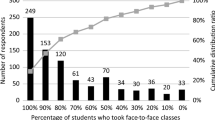Abstract
This paper describes how an idea for technology education materials developed into a process for producing unique curriculum modules for teaching technology in a gender-inclusive way to primary children. Using a case-study format, the paper describes the interaction between participants, the sequential evolution of the materials themselves and the degree to which success was achieved in terms of the original goals. The study demonstrates how an awareness of gender bias needs to be a feature from the earliest stages of curriculum development, through to the trialling and modification stages. The curriculum materials were a product of effective cooperation between teachers, science educators and community representatives. They utilise a “process” approach to the teaching of technology and in this presentation, we demonstrate how this same approach is a useful framework for describing this particular curriculum development.
Similar content being viewed by others
References
Fricke, G.L. (1987). (Chair). Report to the Commission on Technology Education for the State of New Jersey. Technology Education:Learning how to learn in a technological world. New Jersey, USA.
Kinnear, A., Treagust, D., Rennie, L., Lewis, C. (1989).Technology education for upper primary grades. A report prepared for the Schools Technology Group and the Curriculum Development Centre.
Rennie, L., Treagust, D., Kinnear, A. (1992) An evaluation of curriculum materials for teaching technology as a design process.Research in Science & Technology Education (in press).
Williams, R. (1991) Technology in context. In L. J. Rennie, L. H. Parker, & G. M. Hildebrand, (Eds).Action for Equity, The Second Decade, Contributions to the Sixth International GASAT Conference. (Vol. II) pp 789–806. National Key Centre for Science and Mathematics.
Willoughby, K. (1990)Technology choice. A critique of the appropriate technology movement. Westview Press, San Francisco.
Author information
Authors and Affiliations
Additional information
Specializations: primary science and technology education, gender issues.
Specializations: diagnosis of student learning and teaching for conceptual change, technology education, curriculum evaluation.
Specializations: affective aspects of science and technology education, gender issues.
Rights and permissions
About this article
Cite this article
Kinnear, A., Treagust, D. & Rennie, L. Gender-inclusive technology materials for the primary school: A case study in curriculum development. Research in Science Education 21, 224–233 (1991). https://doi.org/10.1007/BF02360476
Issue Date:
DOI: https://doi.org/10.1007/BF02360476



